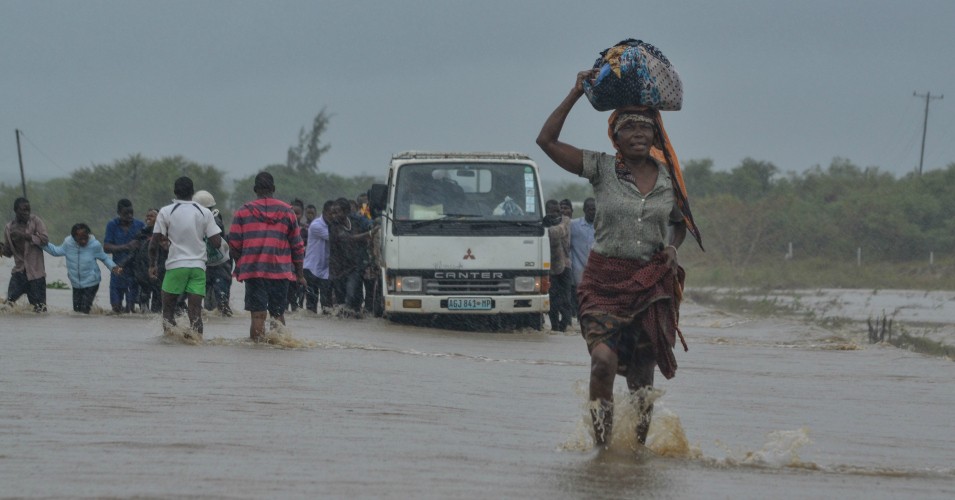
Residents brave the floods in Mazive, southern Mozambique, on April 28, 2019, just weeks after the country suffered one of the worst storms in its history. (Photo: Emidio Josine/AFP via Getty Images)
As world leaders convened in Madrid for COP25 amid surging grassroots demands for radical action, the charitable organization Oxfam released new research Monday showing that climate-related disasters were the leading cause of internal displacement over the past decade, forcing an average of over 20 million people to flee their homes per year.
That, according to Oxfam, amounts to one person every two seconds being forced from their home due to hurricanes, wildfires, cyclones, and other extreme weather.
“Our governments are fueling a crisis that is driving millions of women, men, and children from their homes and the poorest people in the poorest countries are paying the heaviest price,” Chema Vera, acting executive director of Oxfam International, said in a statement.
According to Oxfam’s analysis (pdf), which relied on data Internal Displacement Monitoring Centre, the last decade has seen a dramatic increase in the number of extreme weather disasters that have forced people from their homes.
“Today, you are seven times more likely to be internally displaced by extreme weather disasters… than by geophysical disasters such as earthquakes and volcanic eruptions, and three times more likely than by conflict,” the organization found. “There was a five-fold increase in the reported number of extreme weather disasters that resulted in people being displaced over the last decade.”

Emphasizing that small island nations such as Tuvalu and Cuba face far higher risk of internal displacement due to extreme weather than rich European nations, Oxfam condemned the wealthy nations of the world for making “little progress towards the provision of new funds to help poor countries recover from loss and damage resulting from the climate emergency.”
“Rich donor countries have largely left poor countries to cover the rising costs of extreme weather disasters themselves,” Oxfam said.
To help vulnerable nations recover from previous disasters and prepare for future extreme weather, Oxfam called on world leaders at COP25 to commit to establishing an international “Loss and Damage” fund to assist displaced people and communities.
Oxfam also urged nations to commit to deeper emission cuts and more rapid phase-outs of fossil fuels to limit global warming to 1.5°C by 2030.
“People are taking to the streets across the globe to demand urgent climate action,” Vera said. “If politicians ignore their pleas, more people will die, more people will go hungry and more people will be forced from their homes.”
“Governments can and must make Madrid matter,” Vera added. “They must commit to faster, deeper emissions cuts and they must establish a new ‘Loss and Damage’ fund to help poor communities recover from climate disasters.”
Originally published in CommonDreams.org











































